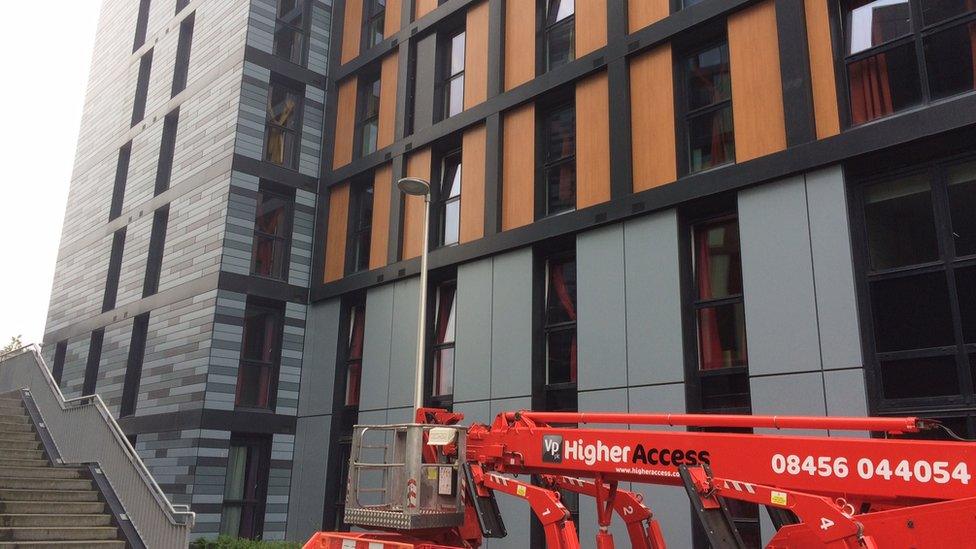'Combustible cladding' found at 57 buildings in Glasgow
- Published

Checks of buildings in Scotland have been undertaken in the wake of the Grenfell Tower fire in London
Combustible cladding has been found in 57 private high-rise properties in Glasgow, council officials have said.
Checks have been under way at buildings across Scotland in the wake of the fatal Grenfell Tower fire in London.
Council official Raymond Barlow told MSPs cladding had been found on some residential buildings in Glasgow, but said "it's not public information yet".
Scottish ministers were informed about the concerns on 8 September, but flat owners in the buildings were not told.
The council later stressed that there was "no suggestion that these buildings are a particular fire risk", and said that it would now be telling property owners.
MSPs and ministers have been conducting inquiries into fire safety and building and planning standards in Scotland in the aftermath of the Grenfell fire, which killed an estimated 80 people.
Combustible cladding
Holyrood's local government and communities committee heard that Glasgow City Council had discovered combustible cladding while looking back over the plans for some private residential properties in the city.
Mr Barlow, assistant head of planning and building standards at the council, said information had come to light "in the last couple of weeks" about "private flatted developments".
He said all the developments had won planning consent prior to 2005, when new housing regulations came into force.
He revealed that neither the Scottish Fire and Rescue Service nor flat owners had been directly informed, but the Scottish government's ministerial working group had been told in the first instance because it was a "national issue".
He said: "We're simply saying we're supplying information to Scottish ministers and then we wish to see what they wish to do with the information before we take it further."
Raymond Barlow said he council wanted the government to decide what happened next
A spokesman for Glasgow City Council said it had inspected "several thousand paper records" before identifying 57 privately owned addresses with "some element" of aluminium composite material (ACM) in their construction.
It is understood that the total number of flats affected is likely to be in the low hundreds.
He said a "much smaller number" had this material as "a substantial part of their make-up", but said the council would have taken action to close down any buildings which were judged to be unsafe.
He added: "There is no suggestion that these buildings are a particular fire risk, all of them have fire systems in place and all of these buildings comply with the building regulations which were in force at the time they were constructed."
"It is important that people have all the information they need but it is also important that people do not panic. This is why we were content to have the ministerial working group consider what to do with this information."
Council leader Susan Aitken said the safety of residents was "paramount" to the administration, saying officers were "working to fully assess the levels of ACM in private accommodation and what, if any, problems this may pose".
'Insufficient' information
Housing minister Kevin Stewart said the government expected Glasgow City Council, as "the body responsible for verification and enforcement of building standards", to inform building owners and ensure additional checks were carried out.
He said the "overall information" provided to ministers by the council on 8 September was "insufficient", and the council was asked to provide further information.
He added that the government had offered support to the council to help them retrieve all the information asked for, an offer which Ms Aitken said officers had been instructed to accept.

Checks have been carried out at buildings across Scotland
Committee convener Bob Doris said MSPs would be seeking further information from the Scottish government and the council "as soon as humanly possible". Mr Stewart is due to give evidence to the committee next week.
Following the meeting, Mr Doris described the news as "deeply concerning", saying residents deserved answers.
He said: "People who are currently living in private high rises and who listened to this today will of course be worried about their safety in their homes.
"We don't want this to cause undue alarm, as these buildings may well be safe, but people who live in these homes deserve answers.
"That's why we've asked Glasgow City Council and the Scottish government to urgently provide us with more information on the extent of this issue and we will put these concerns to the minister when he appears next week."
Building regulations
"Intensive" checks have found that no council-owned domestic high-rise buildings in Scotland use the aluminium composite material (ACM) cladding material identified at Grenfell.
The ministerial working group also said that 30 out of 32 council areas have no ACM cladding on privately owned high-rise buildings, with Glasgow and Edinburgh councils still completing investigations. Edinburgh has since indicated that no such cases have been found.
A type of ACM allowed to be used "appropriately" in non-domestic properties has been found in low-rise school buildings in 14 local authority areas, and checks are ongoing to see if this was fitted properly.
Ministers said "no further issues are expected" from checks of university and college buildings, including halls of residence, while health boards have confirmed that none of their buildings use the cladding type reported to have been used at Grenfell.
Scottish building regulations mean this type of cladding should not be used in high-rise domestic properties, but in some controlled circumstances it can be used in other public buildings - as long as technical requirements are met.